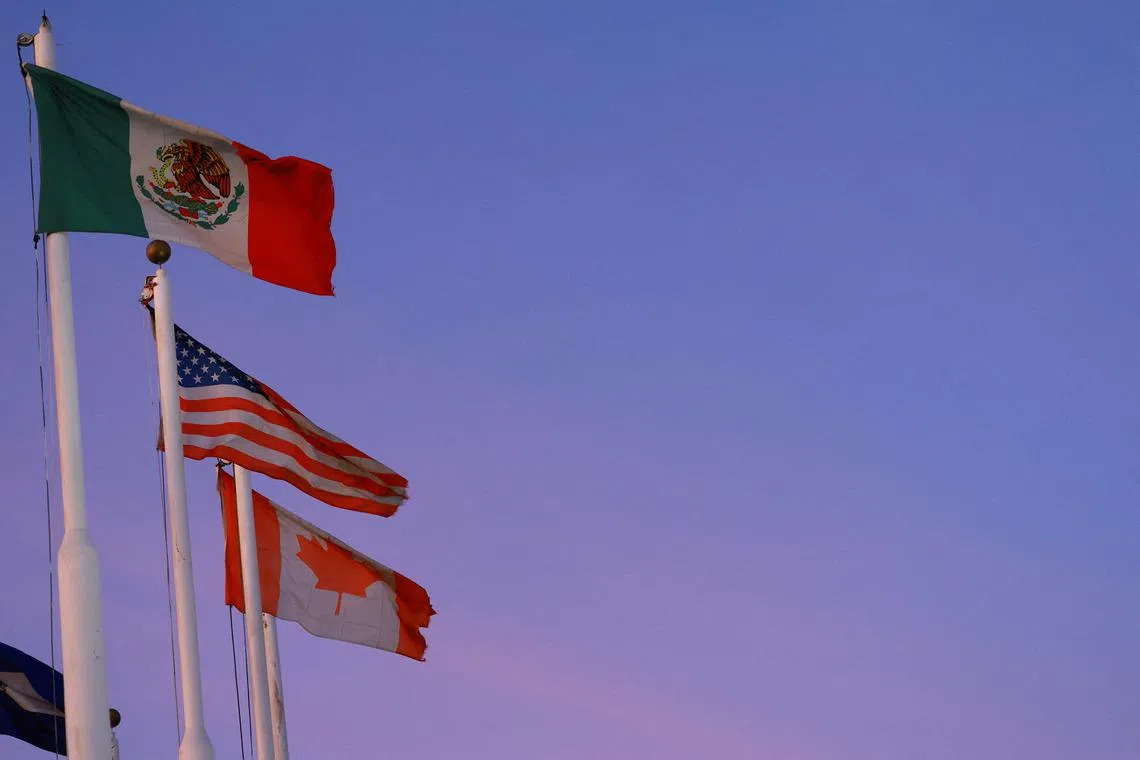Trump stretches trade law boundaries with Canada, Mexico and China tariffs
Sign up now: Get ST's newsletters delivered to your inbox

Trade and legal experts said the 1977 International Emergency Economic Powers Act is untested for imposing import tariffs.
PHOTO: REUTERS
WASHINGTON - US President Donald Trump has pushed into new trade law territory with an emergency sanctions law to justify punishing 25 per cent tariffs on Canadian and Mexican imports, and an extra 10 per cent duty on Chinese goods,
Trade and legal experts said the 1977 International Emergency Economic Powers Act (IEEPA) is untested for imposing import tariffs, and Mr Trump's action will likely face swift court challenges that could set important precedents.
As widely expected, Mr Trump declared a national emergency under IEEPA on Feb 1, citing the “extraordinary threat” from fentanyl and illegal immigration.
The law gives the President broad powers to impose economic and financial sanctions in times of crisis, including against Russia over its war in Ukraine.
IEEPA gave Mr Trump – in his second week of his second term in the White House – the fastest path to imposing tariffs, as trade laws he used in his first four years for duties on steel, aluminium and Chinese goods would have required months-long investigations and public consultations.
“The courts have historically upheld the president’s power to take emergency actions, especially when they are related to national security,” said Mr Tim Brightbill, who co-chairs the international trade practice at law firm Wiley Rein.
“The question is, does that include tariffs, since IEEPA has only been used for sanctions,” Mr Brightbill said.
He added that companies or industry groups would be likely to seek an injunction but may face an uphill battle blocking the tariffs.
“Judges are not likely to second-guess a president on what constitutes an emergency,” said Mr William Reinsch, a trade expert at the Centre for Strategic and International Studies in Washington, adding that the “emergency is whatever he says it is”.
Nixon’s tariffs
The closest parallel to Mr Trump’s action was former president Richard Nixon’s use of IEEPA’s predecessor law, the 1917 Trading With the Enemy Act, to impose a 10 per cent across-the-board US tariff in 1971 to stem rising imports amid a balance-of-payments crisis after pulling the dollar off the gold standard.
Courts upheld Nixon’s action, but Ms Jennifer Hillman, a trade law professor at Georgetown University and former World Trade Organisation appellate judge, said Mr Trump’s action may not fit the emergency.
The Nixon ruling and reporting requirement language in the IEEPA statute suggest that there needs to be a causal connection between the emergency – fentanyl and migrants – and the remedy, universal tariffs on Canada, Mexico and China.
“At least for me, I don’t think there is such a connection in this case,” Ms Hillman said.
“The tariffs would not be applied only to fentanyl, so there is not a clear reason why tariffs on all goods are ‘necessary’ to deal with a problem of fentanyl or migrants.”
Nixon’s use had a much clearer connection between the level of imports and the value of the dollar, she added.
Mr Trump threatened to use the IEEPA in 2019 to back tariffs of 5 per cent on Mexican goods over border migration issues, but never declared an emergency after Mexico agreed to step up border security.
In his first term, Mr Trump also invoked the National Emergencies Act to use federal funds to pay for construction of a wall on the southern border.
If courts allow the use of IEEPA for tariffs to stand, Congress should reform IEEPA to require greater oversight, said Mr Peter Harrell, a national security lawyer and senior fellow at the Centre for a New American Security.
“At the very least, however, courts should find that allowing Trump to wave his magic Sharpie to sign an IEEPA executive order imposing tariffs would upset the balance Congress has long sought to strike when it delegates its tariff authority to the president,” he said in a note on Jan 31.
US Senator Tim Kaine, a Democrat, in January introduced legislation to restrict IEEPA’s use for tariffs, arguing it was never designed nor intended for such tariffs.
“Virginians want lower prices, not higher ones, and the last thing we need are new, senseless taxes on imports from America’s three largest trading partners,” Mr Kaine said on Feb 1. REUTERS


